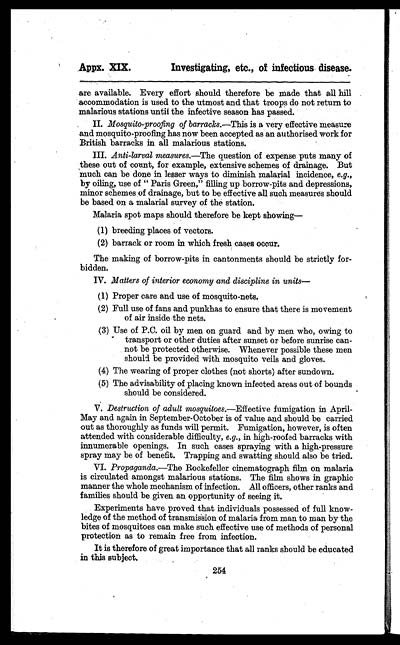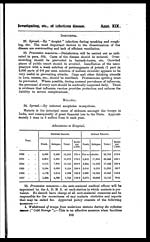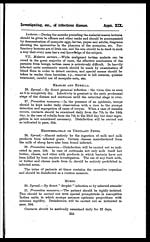Medicine - Institutions > Army health reports and medical documents > Army regulations, India > Regulations for the medical services of the Army of India 1930 > Appendix XIX
(270) Page 254
Download files
Individual page:
Thumbnail gallery: Grid view | List view

Appx. XIX.
Investigating, etc., of infectious disease.
are available. Every effort should therefore be made that all hill
accommodation is used to the utmost and that troops do not return to
malarious stations until the infective season has passed.
II. Mosquito-proofing of barracks. —This is a very effective measure
and mosquito-proofing has now been accepted as an authorised work for
British barracks in all malarious stations.
III. Anti-larval measures .—The question of expense puts many of
these out of count, for example, extensive schemes of drainage. But
much can be done in lesser ways to diminish malarial incidence, e.g. ,
by oiling, use of " Paris Green," filling up borrow-pits and depressions,
minor schemes of drainage, but to be effective all such measures should
be based on a malarial survey of the station.
Malaria spot maps should therefore be kept showing—
(1)breeding places of vectors.
(2) barrack or room in which fresh cases occur.
The making of borrow-pits in cantonments should be strictly for-
bidden.
IV. Matters of interior economy and discipline in units—
(1) Proper care and use of mosquito-nets.
(2) Full use of fans and punkhas to ensure that there is movement
of air inside the nets.
(3) Use of P.C. oil by men on guard and by men who, owing to
transport or other duties after sunset or before sunrise can-
not be protected otherwise. Whenever possible these men
should be provided with mosquito veils and gloves.
(4) The wearing of proper clothes (not shorts) after sundown.
(5) The advisability of placing known infected areas out of bounds
should be considered.
V. Destruction of adult mosquitoes.— Effective fumigation in April-
May and again in September-October is of value and should be carried
out as thoroughly as funds will permit. Fumigation, however, is often
attended with considerable difficulty, e.g ., in high-roofed barracks with
innumerable openings. In such cases spraying with a high-pressure
spray may be of benefit. Trapping and swatting should also be tried.
VI. Propaganda.— The Rockefeller cinematograph film on malaria
is circulated amongst malarious stations. The film shows in graphic
manner the whole mechanism of infection. All officers, other ranks and
families should be given an opportunity of seeing it.
Experiments have proved that individuals possessed of full know-
ledge of the method of transmission of malaria from man to man by the
bites of mosquitoes can make such effective use of methods of personal
protection as to remain free from infection.
It is therefore of great importance that all ranks should be educated
in this subject.
254
Set display mode to: Large image | Zoom image | Transcription
Images and transcriptions on this page, including medium image downloads, may be used under the Creative Commons Attribution 4.0 International Licence unless otherwise stated. ![]()
| Permanent URL | https://digital.nls.uk/74907241 |
|---|
| Description | Notes on investigating, reporting on, and dealing with outbreaks of infectious disease |
|---|---|
| Shelfmark | IP/FA.43 |
|---|---|
| Additional NLS resources: | |
| Description | Contains orders of the Government of India on military medical and sanitary matters. Covers Military Medical Service duties and military hospitals (including diet and equipment), dental treatment. Management of infectious diseases (treatment and vaccinations, disinfecting procedures) shown. Includes troop movements. |
|---|---|
| Shelfmark | IP/FA.43 |




